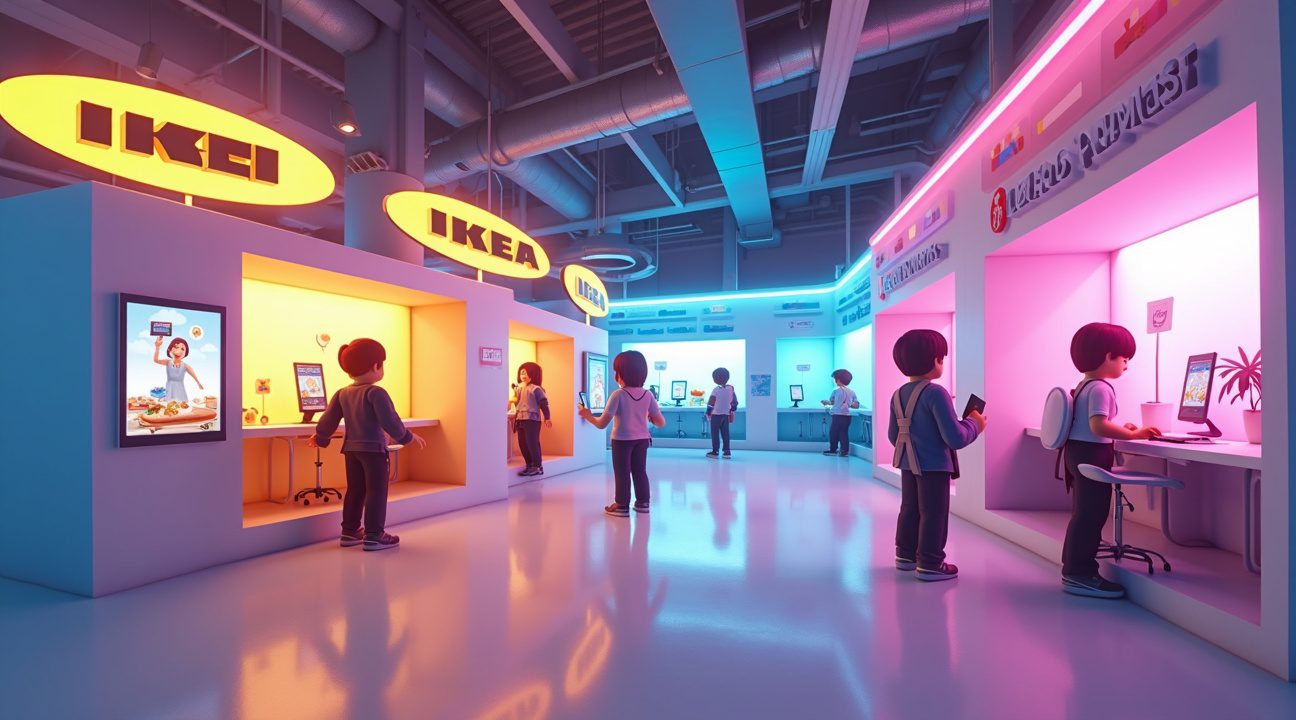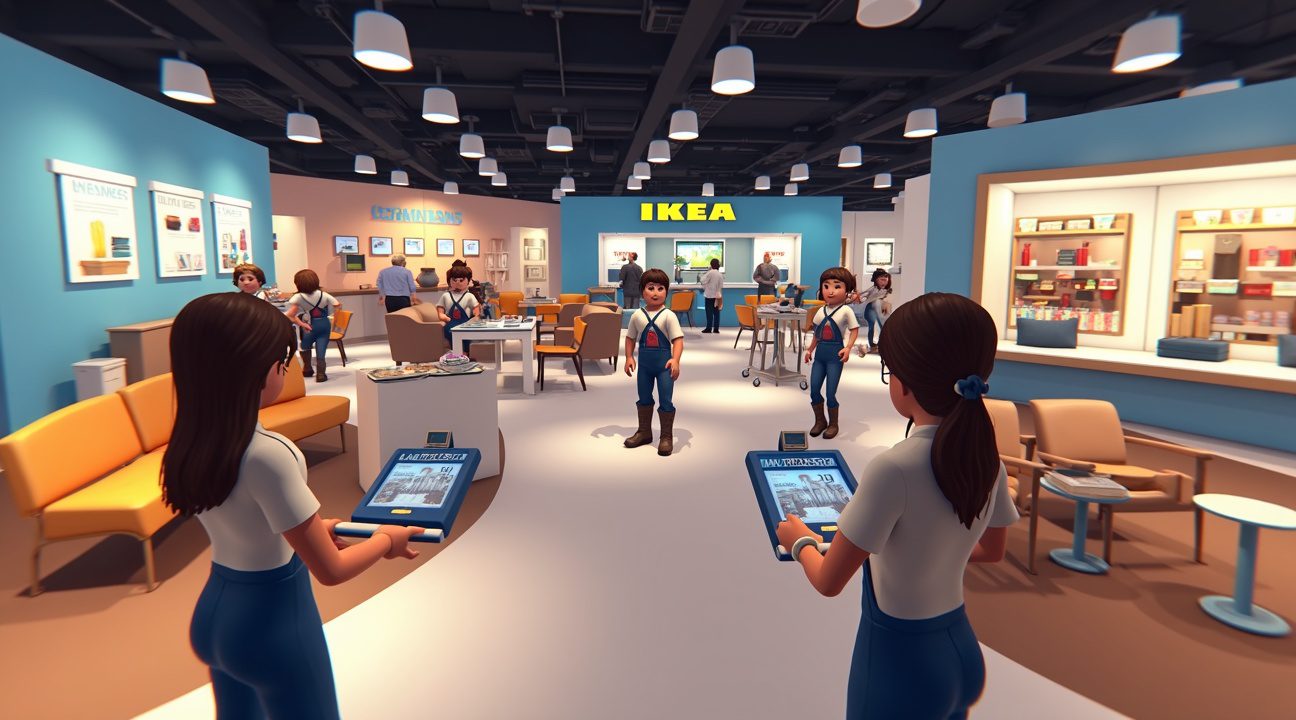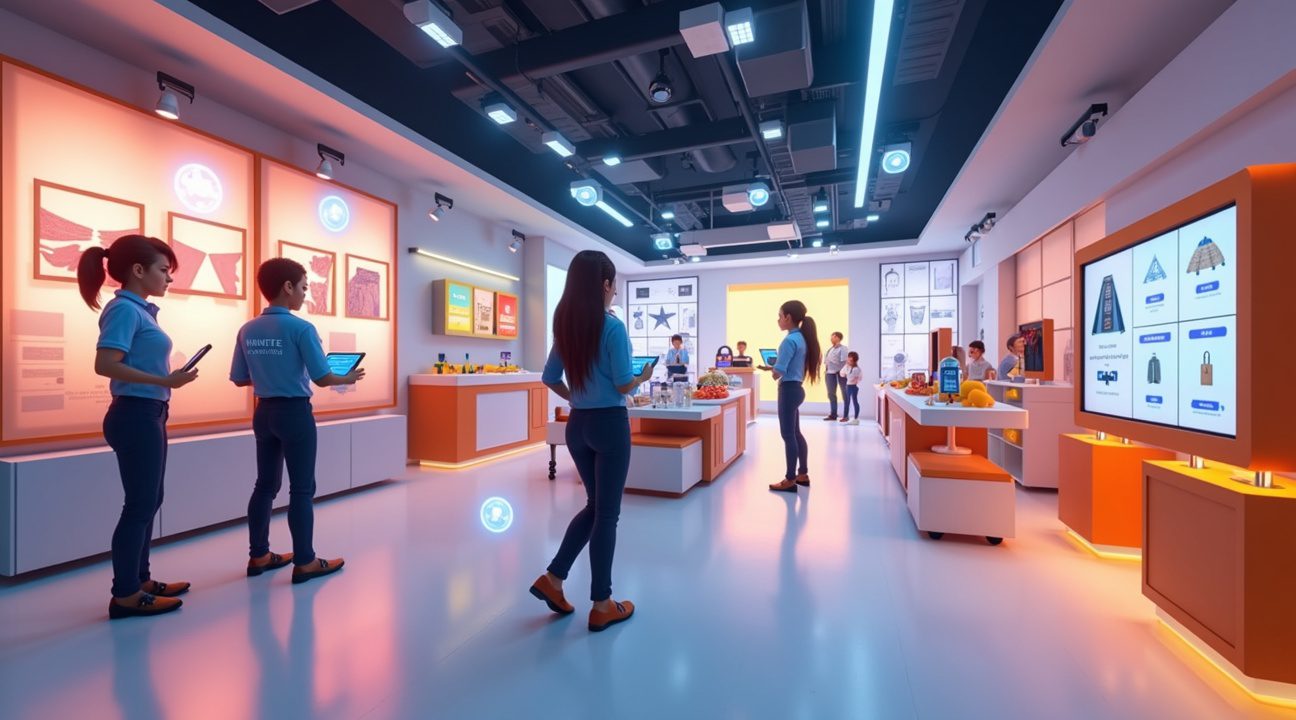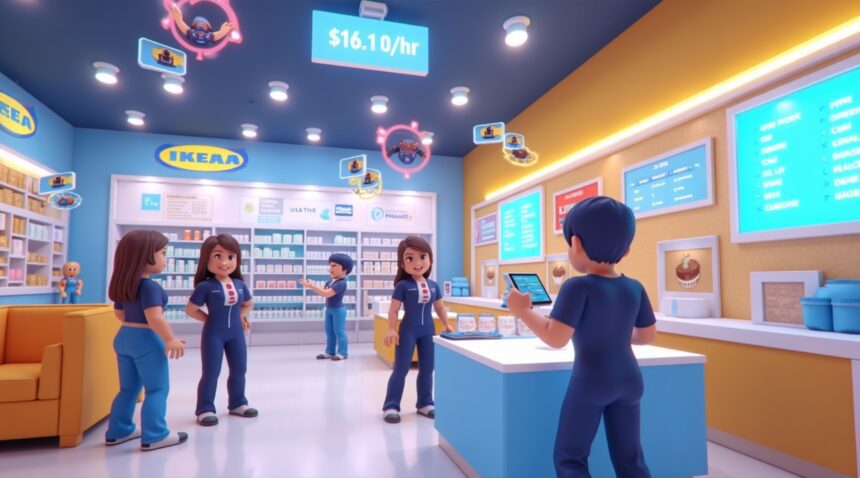IKEA has made history by becoming the first major brand to offer legitimate employment within the Roblox gaming platform, paying workers $16.10 per hour to staff their virtual furniture store.
Key Takeaways
- IKEA pays $16.10 per hour for virtual store positions on Roblox, matching their London employee wages and setting a new standard for virtual employment compensation.
- Only ten exclusive positions were available to UK and Ireland residents aged 18 and over, making this a highly competitive pilot program with strict geographical and age restrictions.
- Virtual employees perform real retail tasks including customer service, furniture arrangement, food service in the digital bistro, and showroom management within the Roblox environment.
- The initiative serves dual purposes as both a recruitment tool to identify potential real-world employees and a marketing strategy to engage younger demographics in their preferred digital spaces.
- This experiment could reshape future employment models by legitimizing virtual work environments and creating new career opportunities that blend gaming skills with traditional job responsibilities.
This initiative by IKEA not only marks a technological milestone but also underlines a broader cultural shift toward recognizing the value of virtual labor. You can read more about this development in [this coverage by CNN](https://www.cnn.com/2024/06/03/tech/ikea-roblox-jobs/index.html).
IKEA Becomes First Brand to Pay Real Wages for Virtual Roblox Work
IKEA has made history by becoming the first major brand to offer paid employment within the Roblox platform, setting wages at $16.10 per hour for virtual co-worker positions. This groundbreaking initiative matches the company’s London-based employee wages of £13.15 per hour, demonstrating a commitment to fair compensation even in digital spaces.
Competitive Hourly Rates Break New Ground
The $16.10 hourly wage represents a significant milestone for virtual employment opportunities. This rate substantially exceeds minimum wage requirements in numerous regions, positioning these virtual co-worker roles as legitimate employment options rather than simple gaming activities. IKEA’s decision to mirror their physical store wages in the digital space reflects a strategic approach to maintaining consistent compensation standards across all work environments.
Many entry-level positions in traditional retail settings offer similar pay scales, making these Roblox-based roles competitive within the broader job market. The company’s wage structure acknowledges that virtual work requires genuine skills and dedication, deserving appropriate financial recognition. This approach could influence how other companies view digital commerce opportunities and virtual employment models.
Pioneering Virtual Employment Standards
By launching the first paid digital job on Roblox, IKEA has established a precedent for virtual employment that extends beyond traditional gaming boundaries. The initiative creates new possibilities for remote work arrangements and challenges conventional perceptions of what constitutes legitimate employment. Virtual co-workers in IKEA’s Roblox store perform actual job functions, justifying the real monetary compensation.
This innovative approach opens doors for individuals who might benefit from flexible, location-independent work opportunities. Students, remote workers, and those seeking supplemental income can now access legitimate employment through gaming platforms. The initiative also demonstrates how brands can leverage virtual environments to create meaningful engagement while providing genuine value to participants.
IKEA’s virtual store represents more than just a marketing gimmick—it’s a functional workspace where employees earn real wages for genuine contributions. The company has carefully structured these positions to ensure they meet employment standards while creating valuable experiences for both workers and customers. This balanced approach helps establish credibility for future virtual employment ventures across various industries.
The success of this program could inspire other major retailers to explore similar opportunities, potentially transforming how people think about work in digital spaces. As virtual worlds become increasingly sophisticated, the line between traditional and digital employment continues to blur. IKEA’s bold move into paid virtual work demonstrates that companies can successfully bridge physical and digital business operations while maintaining fair compensation practices.
This development also highlights the growing importance of alternative income sources in today’s economy. Virtual employment opportunities like these could become increasingly valuable as people seek diverse revenue streams and flexible work arrangements. The initiative proves that virtual platforms can support legitimate business operations and meaningful employment relationships.
The Co-Worker Game: Inside IKEA’s Virtual Employment Experiment
On June 24, 2024, IKEA launched an unprecedented initiative that blurred the lines between gaming and traditional employment. The Co-Worker Game offered ten exclusive paid positions within their virtual Roblox store, marking a bold step into the metaverse job market. I find this development particularly fascinating as it represents one of the first legitimate paid roles in virtual worlds that compensate workers with actual currency rather than digital tokens.
The Swedish furniture giant designed these virtual positions to mirror real-world IKEA employment experiences with remarkable accuracy. Participants found themselves helping virtual customers navigate showroom displays, working across various departments from furniture to home accessories, and serving meals in the virtual restaurant area. The level of detail extended to organizing showroom spaces and maintaining the store’s aesthetic appeal, tasks that any physical IKEA employee would recognize immediately.
What sets this experiment apart from typical gaming experiences is the genuine career progression opportunities built into the system. Virtual employees could earn promotions based on their performance, creating a parallel career ladder that mimics the advancement structure found in physical IKEA stores. This approach demonstrates how e-commerce evolution continues to push boundaries in unexpected directions.
Eligibility and Legal Framework
The opportunity remained strictly limited to UK and Ireland residents aged 18 and over, reflecting IKEA’s careful adherence to local labor laws and regulations. This geographical restriction highlights the complex legal considerations companies face when creating virtual employment opportunities. The age requirement ensures compliance with minimum wage legislation and employment standards that govern traditional workplaces.
The exclusivity factor cannot be understated—with only ten positions available, IKEA created a highly competitive environment that generated significant buzz across social media platforms. This scarcity likely contributed to the project’s viral success while allowing the company to manage the experimental program on a manageable scale.
The initiative represents more than just a marketing stunt; it signals a genuine exploration of future workplace models. Companies across industries are watching these developments closely, particularly as gaming platforms continue to evolve into sophisticated virtual environments. The success of this experiment could influence how businesses approach remote work, virtual training programs, and customer service delivery.
IKEA’s venture into virtual employment comes at a time when many organizations are reconsidering traditional work structures. The pandemic accelerated acceptance of remote work arrangements, and virtual reality technologies are becoming increasingly accessible. By offering real compensation for virtual work, IKEA positions itself at the forefront of this technological shift while gathering valuable data about virtual workplace dynamics.
The decision to use Roblox as the platform demonstrates strategic thinking about audience engagement. Roblox’s massive user base and established virtual economy make it an ideal testing ground for new employment models. The platform’s existing infrastructure supports complex interactions and transactions, providing the technical foundation necessary for this type of experimentation.
For participants, the opportunity represents more than just earning money while gaming. They gain genuine work experience in customer service, team collaboration, and retail operations—skills that translate directly to traditional employment settings. This practical value adds legitimacy to the virtual roles and distinguishes them from typical gaming achievements.
The broader implications extend beyond IKEA’s immediate goals. Other retailers are likely evaluating similar initiatives as they seek innovative ways to connect with younger demographics and explore new revenue streams. The success of virtual employment could accelerate the development of alternative income opportunities for individuals seeking flexible work arrangements.
This experiment challenges conventional notions about workplace boundaries and employment structures. As virtual worlds become more sophisticated and widespread, the distinction between physical and digital work environments continues to blur. IKEA’s initiative serves as a practical case study for understanding how businesses might operate in increasingly digital futures.
https://www.youtube.com/watch?v=FgW4cJ7rwBM
How to Land a Job in IKEA’s Virtual Store
The application window for IKEA’s virtual store positions opened June 3 and closed June 16, 2024, giving interested candidates a narrow two-week timeframe to submit their materials through the official website. I found the application process refreshingly straightforward compared to traditional retail hiring procedures.
Application Requirements and Process
Candidates needed to complete three main components during the application phase:
- Applicants filled out a comprehensive questionnaire that gauged their interest in virtual work environments and basic qualifications.
- They uploaded an updated CV highlighting relevant skills and experiences.
- An optional short personality video allowed candidates to demonstrate their unique qualities and creative thinking abilities.
This optional video component set IKEA’s virtual hiring apart from conventional retail applications. Candidates used this opportunity to showcase personality traits that don’t typically shine through on paper. The flexibility allowed applicants to express creativity while giving hiring managers insight into communication styles and comfort levels with digital platforms.
Interview Stage and Evaluation Criteria
Shortlisted candidates advanced to digital interviews designed specifically for virtual work assessment. These interviews evaluated three core competencies that I consider essential for success in digital retail environments:
- Communication skills through virtual platforms and digital interaction scenarios
- Problem-solving abilities using creative thinking and adaptability
- Comfort level with technology and digital work settings
IKEA deliberately emphasized that retail experience wasn’t required for these positions. Instead, hiring managers prioritized curiosity and adaptability—qualities that translate well to virtual work environments. This approach opened opportunities for candidates from diverse backgrounds who might not have considered retail work previously.
The interview questions reflected the unique nature of virtual retail work. Candidates faced creative scenarios like handling a shortage of “pixelated hotdogs” in the virtual store, testing their ability to think quickly and maintain customer service standards in unconventional situations. Another memorable question asked applicants which IKEA furniture item best represented their personality, allowing candidates to demonstrate product knowledge while revealing personal characteristics.
These unconventional interview approaches mirror trends I’ve observed in digital commerce evolution, where companies seek employees who can adapt to rapidly changing virtual environments. The questions tested candidates’ ability to blend creativity with practical problem-solving—skills increasingly valuable as businesses explore new digital frontiers.
IKEA’s hiring process recognized that virtual retail requires different competencies than traditional in-store work. Success in platforms like Roblox demands comfort with gaming interfaces, understanding of virtual customer behavior, and ability to maintain brand standards in digital spaces. The company’s emphasis on creativity and adaptability over traditional retail metrics suggests they understood the pioneering nature of this initiative.
The compressed timeline from application to hiring decision reflected both the experimental nature of the program and IKEA’s commitment to moving quickly in the digital space. This rapid hiring approach resembles strategies I’ve seen in tech industry acquisitions, where companies act decisively when entering new markets or testing innovative concepts.
Candidates who successfully navigated this process demonstrated qualities that extend beyond traditional retail skills. They showed willingness to embrace new technology, creativity in problem-solving, and communication abilities that translate effectively to virtual environments. These competencies position them well for future opportunities as virtual retail continues expanding across various platforms and industries.

Virtual Meatballs and Digital Showrooms: What Employees Actually Do
IKEA’s virtual Roblox store transforms traditional retail work into an engaging digital experience where employees perform familiar tasks in a completely new environment. Virtual workers guide customers through digital showrooms, arrange furniture displays, and serve customers at the Swedish Food Market and Bistro — all while earning real wages for their virtual labor.
The digital bistro presents one of the most unique aspects of this virtual employment opportunity. Staff members serve virtual meatballs and other Swedish delicacies to customers exploring the store. This mirrors IKEA’s real-world food service experience, where the cafeteria often becomes a destination in itself. Virtual employees learn customer service skills while managing orders and ensuring smooth operations in this digital dining space.
Core Responsibilities and Career Advancement
Virtual IKEA employees handle several key responsibilities that directly parallel traditional retail roles:
- Customer guidance through digital showrooms and product demonstrations
- Product display organization and furniture arrangement in virtual spaces
- Food service operations in the Swedish Market and Bistro
- Inventory management and virtual store maintenance
- Customer support and assistance with digital purchases
Career advancement remains possible within this virtual structure, with employees potentially earning promotions based on performance and dedication. This progression system mirrors e-commerce trends where digital retail experiences become increasingly sophisticated.
The virtual store showcases IKEA’s complete product range, including popular items like HEMNES furniture collections. Employees help customers visualize these products in virtual room settings, demonstrating functionality and design possibilities. While the broader Roblox community can freely explore the virtual world and win exclusive digital goods, only designated employees receive compensation for their work.
This digital retail environment represents a significant shift from traditional gaming monetization. Unlike typical gaming platforms where players invest time without monetary return, IKEA’s approach compensates workers for meaningful virtual labor. The $16.10 hourly rate reflects genuine employment rather than casual gaming participation.
Virtual employees must demonstrate real customer service skills, product knowledge, and professional communication abilities. The digital environment doesn’t diminish the importance of these core retail competencies — it simply transfers them to a new platform where younger demographics feel comfortable engaging with brands and making purchasing decisions.

Why IKEA Ventured Into Paying Gamers Real Money
IKEA’s bold move to offer $16.10 per hour for virtual store work on Roblox represents a calculated strategy to connect with younger demographics in their natural digital habitat. The Swedish furniture giant recognized that traditional recruitment methods weren’t resonating with Gen Z and young adults who spend countless hours immersed in virtual worlds like Roblox.
Roblox commands attention from over 70 million daily active users, with a significant portion falling into IKEA’s target demographic. By establishing a presence on this platform and offering real compensation, IKEA positioned itself as an innovative employer willing to meet potential workers where they already spend their time. This approach acknowledges that digital commerce platforms continue reshaping how brands interact with consumers and employees alike.
A Dual-Purpose Strategy: Recruitment Meets Marketing
The virtual store initiative served two distinct but interconnected purposes:
- Recruitment Tool: It allowed IKEA to identify candidates who might not have considered traditional retail employment. Players who demonstrated dedication, customer service skills, and creativity in the virtual environment could translate these abilities to real-world positions.
- Brand Amplification: The program enhanced IKEA’s presence among younger consumers by creating an interactive experience that showcased their products and company culture.
Rather than spending money on conventional advertising, the company invested in this organic virtual engagement. Participants became brand ambassadors simply by interacting with the virtual store in a meaningful way, creating promotions that felt authentic rather than forced.
The initiative also reflected IKEA’s progressive stance on career development. Unlike traditional companies that maintain rigid hierarchical structures, IKEA embraces what they call non-linear career progression. This philosophy suggests that employees can grow and develop across various roles and departments without following a predetermined path. The virtual store experiment embodied this principle by demonstrating that valuable skills can emerge from unexpected places, including gaming environments.
By paying real wages for digital labor, IKEA sparked important conversations about work’s future. The program challenged conventional notions of what constitutes “real” work and whether virtual environments can provide legitimate employment opportunities. This question becomes increasingly relevant as technology companies continue pushing boundaries in digital spaces.
Elevating the Game: Compensation in Virtual Environments
The gamification of work isn’t entirely new, but IKEA’s approach elevated the concept by offering tangible compensation. While many companies use game-like elements to motivate productivity, few have directly paid participants for virtual activities. IKEA’s precedent may influence how other organizations approach recruitment and employee engagement, especially as younger generations join the workforce with different expectations about work-life integration.
IKEA’s experiment also highlighted the potential for digital employment spaces to become legitimate career paths. As virtual platforms become more sophisticated and mainstream, the boundary between digital and physical work continues to blur. IKEA’s willingness to invest real money in virtual employees suggests they see real value in these platforms beyond mere marketing exposure.
Strategic Timing and Measurable Impact
The timing of this initiative proved particularly strategic. With remote work becoming normalized in the wake of global workplace shifts, companies needed creative ways to connect with potential employees. IKEA’s virtual store offered a unique solution that felt relevant and engaging rather than desperate or gimmicky.
The program’s success metrics likely included:
- How many virtual workers transitioned to real-world positions at IKEA.
- Brand engagement and mentions across social media and news platforms.
By evaluating these outcomes, IKEA could determine whether investment in digital labor yielded meaningful returns in both recruitment and brand value.
This innovative approach to recruitment and marketing demonstrates how forward-thinking companies adapt to changing demographics and communication preferences. Rather than lamenting that younger generations don’t respond to traditional methods, IKEA chose to innovate within established digital communities. The decision to pay real wages for virtual work signals a broader recognition that the future of employment may look very different from traditional models, with companies that embrace these changes positioning themselves as employers of choice for digital natives.
https://www.youtube.com/watch?v=Bq1C5sD9rUM
Setting the Stage for the Future of Digital Employment
IKEA’s virtual employment experiment on Roblox represents a fascinating glimpse into how work might transform in the coming years. The furniture giant’s decision to offer real wages of $16.10 per hour for virtual store positions demonstrates that major corporations are beginning to recognize the potential of digital spaces as legitimate work environments.
Pioneering Virtual Work Environments
This pilot project breaks new ground by treating virtual spaces as actual workplaces rather than just marketing gimmicks. I’ve observed how companies have traditionally used gaming platforms for advertising, but IKEA’s approach differs significantly by creating genuine employment opportunities within these digital environments. The initiative suggests that brands might soon view virtual worlds as extensions of their physical operations, complete with staffing needs and real compensation structures.
The timing of this experiment aligns perfectly with a generation that grew up immersed in digital environments. Young workers who’ve spent countless hours in virtual spaces now find themselves in a position where their digital fluency becomes a valuable job skill. This shift mirrors broader changes in how we think about work locations and traditional employment structures, similar to how e-commerce transformed retail.
Implications for Future Employment Models
The potential applications extend far beyond furniture retail. Gaming platforms could become testing grounds for various industries looking to engage with digital-native audiences while creating meaningful work opportunities. I can envision scenarios where:
- Fashion brands hire virtual stylists
- Tech companies employ digital customer support representatives
- Entertainment companies recruit virtual event coordinators
This development also suggests a future where job seekers might need to consider their avatar presentation skills alongside traditional qualifications. Virtual work environments could offer unique advantages, including reduced overhead costs for employers and increased accessibility for workers who face geographical or physical limitations in traditional workplaces.
The economic implications are particularly intriguing. Virtual employment could help address labor shortages in certain sectors while providing flexible income opportunities for individuals seeking non-traditional work arrangements. Just as people have found alternative ways to manage their finances, virtual work represents another avenue for earning income in an increasingly digital economy.
However, this shift also raises important questions about worker protections, benefits, and the long-term sustainability of such employment models. Companies venturing into virtual employment will need to address these concerns while ensuring that digital work environments maintain the same standards as traditional workplaces.
The success of IKEA’s experiment could influence how other major corporations approach virtual spaces. If the pilot proves effective in terms of customer engagement and operational efficiency, we might see a rapid expansion of similar programs across various industries. This could fundamentally alter how businesses think about staffing, customer service, and brand representation in digital environments.
The convergence of gaming, work, and commerce represents a significant evolution in how we define employment. Much like how major acquisitions reshape entire platforms, IKEA’s virtual employment initiative could reshape how we think about work itself. The limited initial rollout in 2024 serves as a proof of concept that could scale dramatically if successful.
Virtual employment also opens doors for creative job roles that don’t exist in traditional settings. Virtual store associates might need skills in digital customer interaction, avatar-based communication, and virtual space management—capabilities that blend traditional retail knowledge with gaming expertise.
As this trend develops, I expect to see new educational programs and training initiatives designed to prepare workers for virtual employment opportunities. The intersection of work and gaming creates unique requirements that traditional job training hasn’t addressed, potentially spawning entirely new career development pathways.
The implications reach beyond individual employment opportunities to suggest fundamental changes in how we structure work-life balance, professional development, and career progression in an increasingly digital world.

Sources:
Voice Lapaas, “IKEA Pays $16.10/Hour for Jobs in Virtual Roblox Store”
thespike.gg, “How to apply for the IKEA Roblox job”
Fox Business, “IKEA to open virtual store in Roblox – and pay employees real money”
IKEA.com UK Press Release, “IKEA is opening a new store on Roblox”


